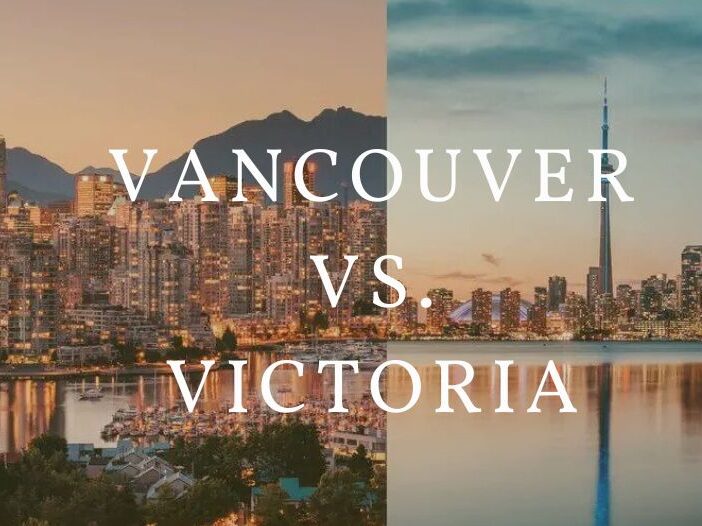
The west coast of Canada is renowned for its stunning natural beauty, diverse culture, and high quality of life. When considering a move to British Columbia, two cities stand out: Vancouver and Victoria. Each offers its unique charm, lifestyle, and advantages. In this article, we’ll compare Vancouver and Victoria across various aspects to help you make an informed decision about which city is better suited for your preferences and needs.
1. Urban Vibrance:
Vancouver: As a bustling metropolis, Vancouver offers a vibrant urban experience. Its diverse neighborhoods, cultural scene, and extensive dining and entertainment options attract residents seeking a fast-paced lifestyle. From the historic Gastown to the modern Yaletown, Vancouver is a hub of activity.
Victoria: On the other hand, Victoria exudes a more relaxed and laid-back vibe. The city’s smaller size contributes to a slower pace of life, making it an ideal choice for those who prefer a quieter atmosphere. The Inner Harbour, with its charming historic architecture, is a focal point of the city’s cultural and recreational offerings.
2. Natural Beauty:
Vancouver: Nestled between mountains and ocean, Vancouver boasts stunning natural surroundings. Residents enjoy breathtaking views, outdoor activities, and easy access to parks and beaches. Stanley Park, Grouse Mountain, and nearby Whistler provide year-round opportunities for nature enthusiasts.
Victoria: Known as the “Garden City,” Victoria’s lush landscapes and temperate climate create a haven for outdoor lovers. The Butchart Gardens, Beacon Hill Park, and the serene coastline offer a tranquil escape in the lap of nature.
3. Cost of Living:
Vancouver: While offering numerous amenities, Vancouver’s cost of living can be higher than in other Canadian cities. Housing prices, in particular, tend to be elevated. Renting or purchasing property may require a larger financial commitment.
Victoria: Generally, Victoria’s cost of living is lower than Vancouver’s, making it an attractive option for individuals seeking a more affordable lifestyle. Housing costs are comparatively reasonable, and day-to-day expenses may be less burdensome.
4. Employment Opportunities:
Vancouver: As a major economic hub, Vancouver provides a wide range of job opportunities across industries like technology, finance, tourism, and entertainment. Its diverse economy can be appealing to professionals seeking career growth.
Victoria: While not as large as Vancouver, Victoria’s economy is also diverse, with a focus on technology, government, and education sectors. Its smaller job market can be advantageous for individuals seeking a close-knit community and niche job prospects.
5. Education and Healthcare:
Both cities offer quality education and healthcare services, but Vancouver’s larger size translates to a broader range of educational institutions, including universities and colleges. Victoria’s smaller scale might lead to a more personalized education experience.
Read More: Exploring the Disadvantages of Living on Vancouver Island
6. Cultural and Entertainment Scene:
Vancouver’s cultural diversity is reflected in its vibrant arts and entertainment scene. It hosts numerous festivals, theaters, galleries, and culinary experiences that cater to various tastes. Victoria, while smaller, still offers a rich cultural scene with historical sites, museums, and a thriving arts community.
7. Commute and Transportation:
Vancouver’s larger size can lead to more traffic congestion and longer commutes, despite its robust public transportation system. Victoria’s smaller size generally means shorter commutes and less traffic congestion.
Conclusion:
Choosing between Vancouver and Victoria comes down to your personal preferences and priorities. If you thrive in a dynamic urban environment with diverse opportunities, Vancouver might be your ideal choice. On the other hand, if you value a slower pace of life, access to nature, and a more affordable living arrangement, Victoria could be the better fit. Both cities offer unique advantages, so take your time to consider what aligns with your lifestyle, career goals, and overall happiness.

